
discord-ai-bot
Discord AI chatbot using Ollama
Stars: 245
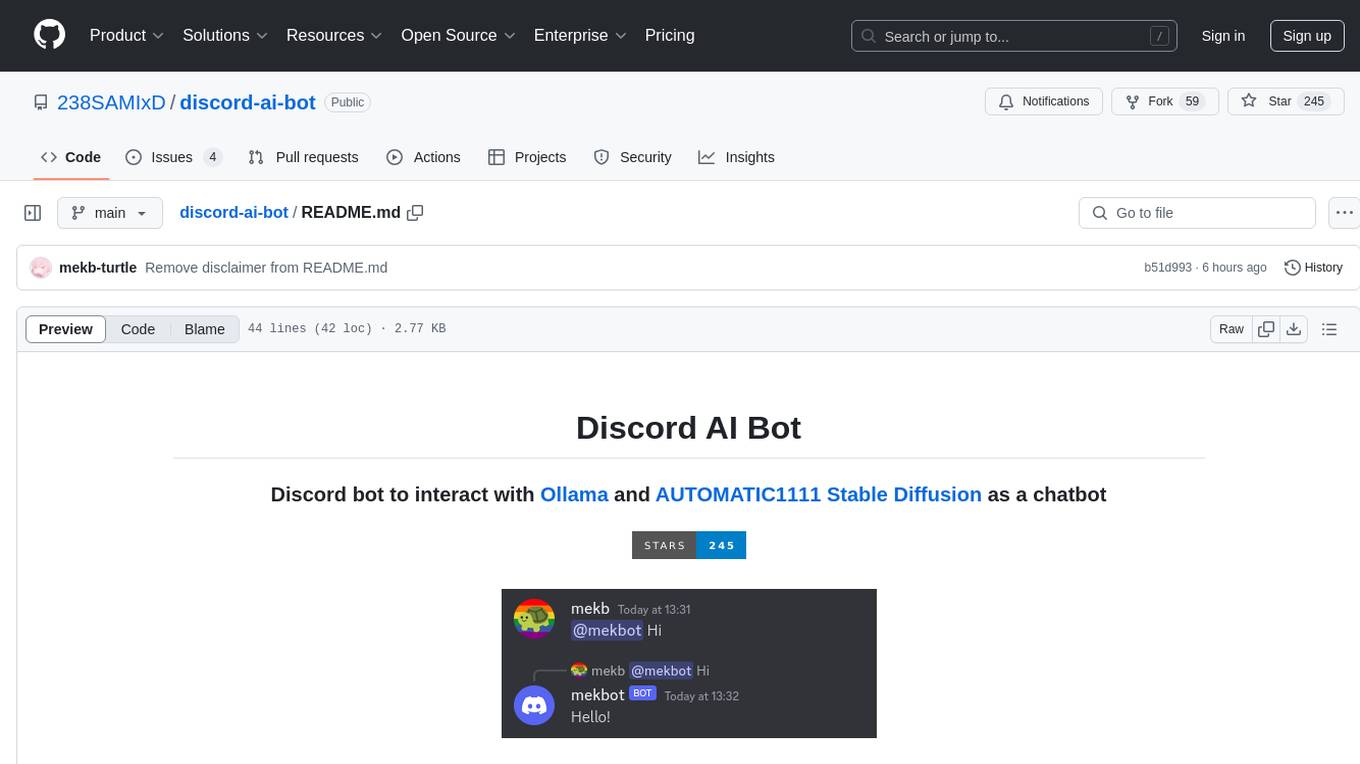
Discord AI Bot is a chatbot tool designed to interact with Ollama and AUTOMATIC1111 Stable Diffusion on Discord. The bot allows users to set up and configure a Discord bot to communicate with the mentioned AI models. Users can follow step-by-step instructions to install Node.js, Ollama, and the required dependencies, create a Discord bot, and interact with the bot by mentioning it in messages. Additionally, the tool provides set-up instructions for Docker users to easily deploy the bot using Docker containers. Overall, Discord AI Bot simplifies the process of integrating AI chatbots into Discord servers for interactive communication.
README:
- Install Node.js (if you have a package manager, use that instead to install this)
- Make sure to install at least v14 of Node.js
- Install Ollama (ditto)
- Pull (download) a model, e.g
ollama pull orcaorollama pull llama2 - Start Ollama by running
ollama serve -
Create a Discord bot
- Under Application » Bot
- Enable Message Content Intent
- Enable Server Members Intent (for replacing user mentions with the username)
- Under Application » Bot
- Invite the bot to a server
- Go to Application » OAuth2 » URL Generator
- Enable
bot - Enable Send Messages, Read Messages/View Channels, and Read Message History
- Under Generated URL, click Copy and paste the URL in your browser
- Rename
.env.exampleto.envand edit the.envfile- You can get the token from Application » Bot » Token, never share this with anyone
- Make sure to change the model if you aren't using
orca - Ollama URL can be kept the same unless you have changed the port
- You can use multiple Ollama servers at the same time by separating the URLs with commas
- Set the channels to the channel ID, comma separated
- In Discord, go to User Settings » Advanced, and enable Developer Mode
- Right click on a channel you want to use, and click Copy Channel ID
- You can edit the system message the bot uses, or disable it entirely
- Install the required dependencies with
npm i - Start the bot with
npm start - You can interact with the bot by @mentioning it with your message
- Install Stable Diffusion
- Run the script
./webui.sh --api --listen
- Install Docker
- Should be atleast compatible with version 3 of compose (docker engine 1.13.0+)
- Repeat steps 2—7 from the other setup instructions
- Start the bot with
make compose-upif you have Make installed- Otherwise, try
docker compose -p discord-ai upinstead
- Otherwise, try
- You can interact with the bot by @mentioning it with your message
For Tasks:
Click tags to check more tools for each tasksFor Jobs:
Alternative AI tools for discord-ai-bot
Similar Open Source Tools

discord-ai-bot
Discord AI Bot is a chatbot tool designed to interact with Ollama and AUTOMATIC1111 Stable Diffusion on Discord. The bot allows users to set up and configure a Discord bot to communicate with the mentioned AI models. Users can follow step-by-step instructions to install Node.js, Ollama, and the required dependencies, create a Discord bot, and interact with the bot by mentioning it in messages. Additionally, the tool provides set-up instructions for Docker users to easily deploy the bot using Docker containers. Overall, Discord AI Bot simplifies the process of integrating AI chatbots into Discord servers for interactive communication.
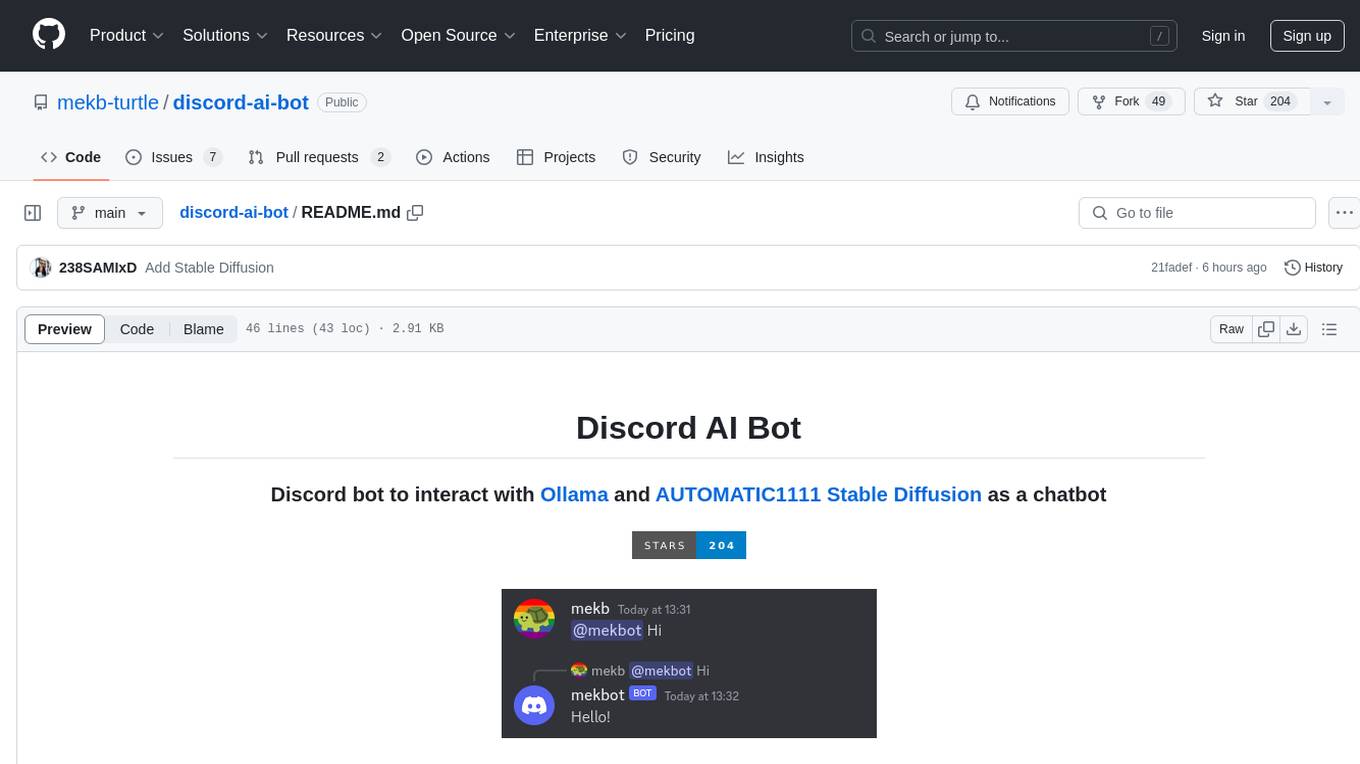
discord-ai-bot
Discord AI Bot is a chatbot designed to interact with Ollama and AUTOMATIC1111 Stable Diffusion on Discord. The project is now archived due to lack of maintenance. Users can set up the bot by installing Node.js, Ollama, and a model, creating a Discord bot, and starting the bot with the necessary configurations. Additionally, Docker setup instructions are provided for easy deployment. The bot can be interacted with by mentioning it in Discord messages.
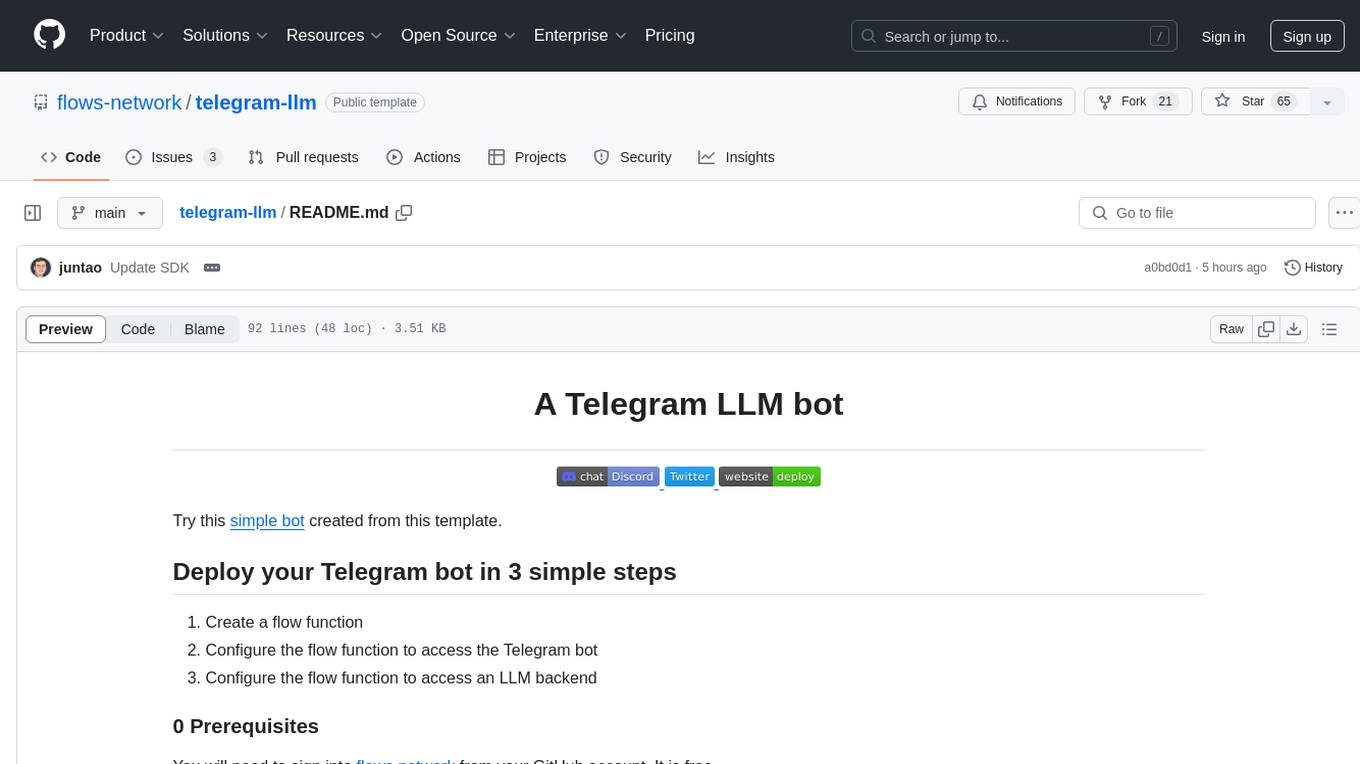
telegram-llm
A Telegram LLM bot that allows users to deploy their own Telegram bot in 3 simple steps by creating a flow function, configuring access to the Telegram bot, and connecting to an LLM backend. Users need to sign into flows.network, have a bot token from Telegram, and an OpenAI API key. The bot can be customized with ChatGPT prompts and integrated with OpenAI and Telegram for various functionalities.
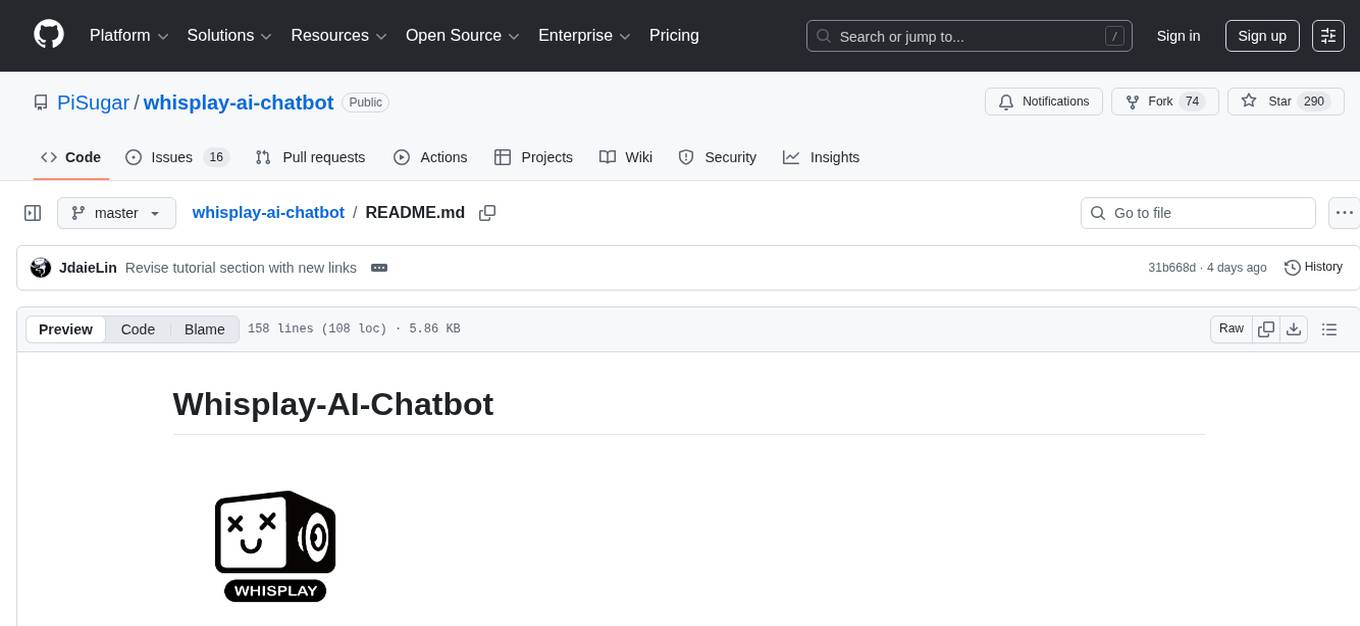
whisplay-ai-chatbot
Whisplay-AI-Chatbot is a pocket-sized AI chatbot device built using a Raspberry Pi Zero 2w. It features a PiSugar Whisplay HAT with an LCD screen, on-board speaker, and microphone. Users can interact with the chatbot by pressing a button, speaking, and receiving responses, similar to a futuristic walkie-talkie. The tool supports various functionalities such as adjusting volume autonomously, resetting conversation history, local ASR and TTS capabilities, image generation, and integration with APIs like Google Gemini and Grok. It also offers support for LLM8850 AI Accelerator for offline capabilities like ASR, TTS, and LLM API. The chatbot saves conversation history and generated images in a data folder, and users can customize the tool with different enclosure cases available for Pi02 and Pi5 models.
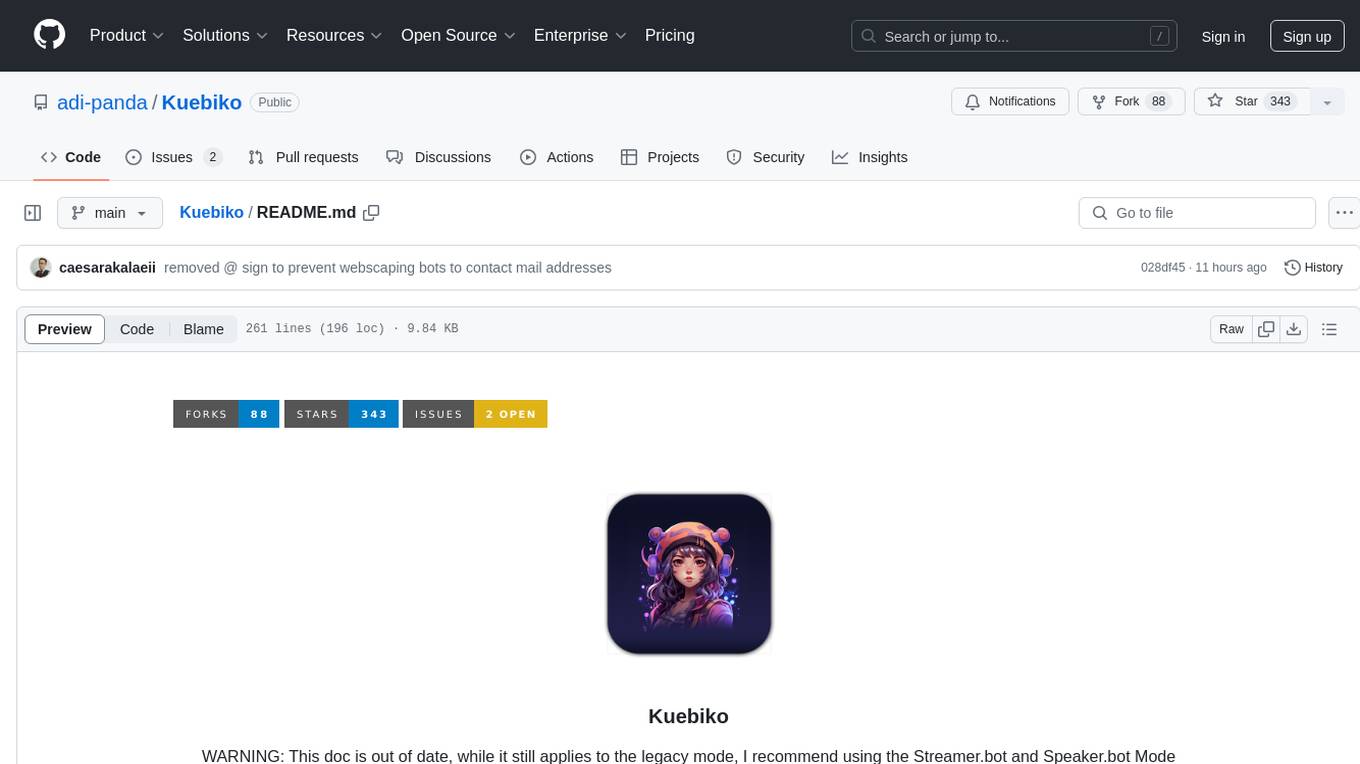
Kuebiko
Kuebiko is a Twitch Chat Bot that reads twitch chat and generates text-to-speech responses using Google Cloud API and OpenAI's GPT-3 text completion model. It allows users to set up their own VTuber AI similar to 'Neuro-Sama'. The project is built with Python and requires setting up various API keys and configurations to enable the bot functionality. Users can customize the voice of their VTuber and route audio using VBAudio Cable. Kuebiko provides a unique way to interact with viewers through chat responses and captions in OBS.
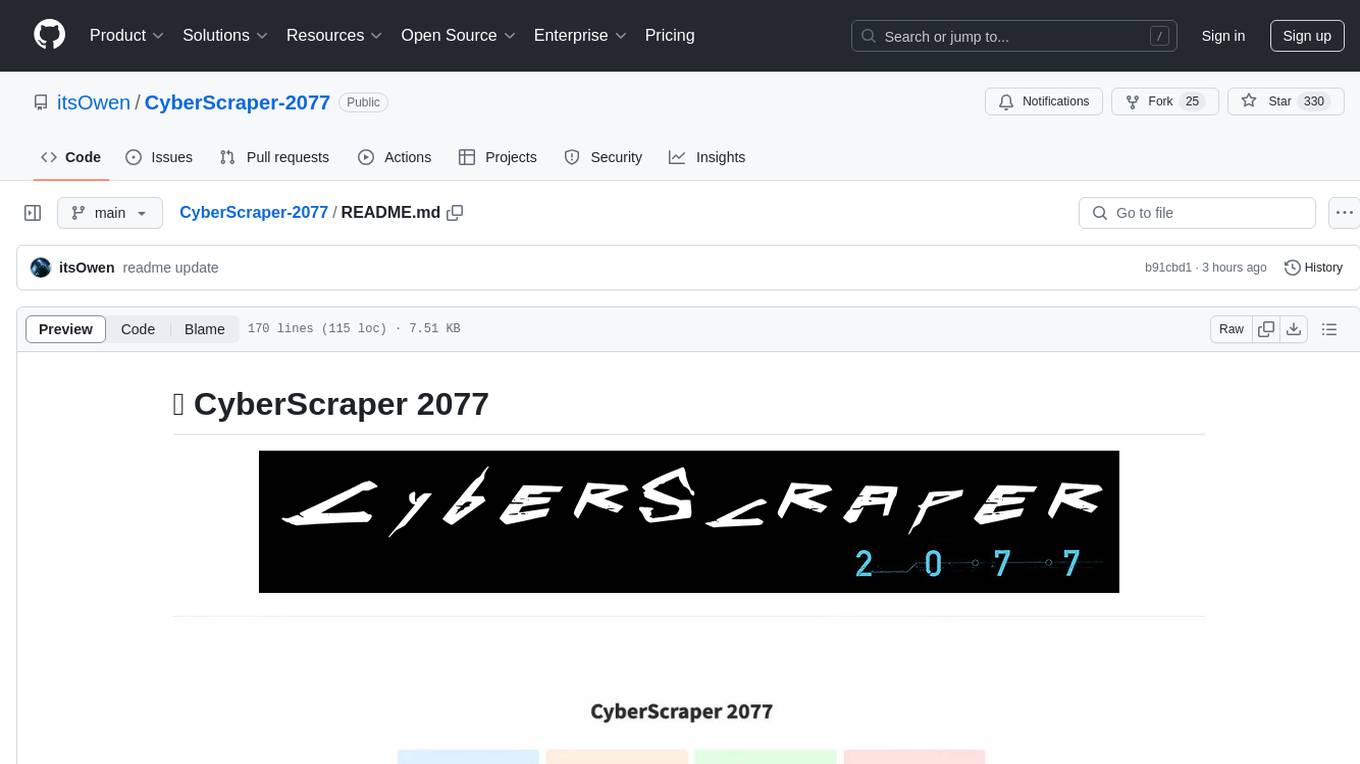
CyberScraper-2077
CyberScraper 2077 is an advanced web scraping tool powered by AI, designed to extract data from websites with precision and style. It offers a user-friendly interface, supports multiple data export formats, operates in stealth mode to avoid detection, and promises lightning-fast scraping. The tool respects ethical scraping practices, including robots.txt and site policies. With upcoming features like proxy support and page navigation, CyberScraper 2077 is a futuristic solution for data extraction in the digital realm.
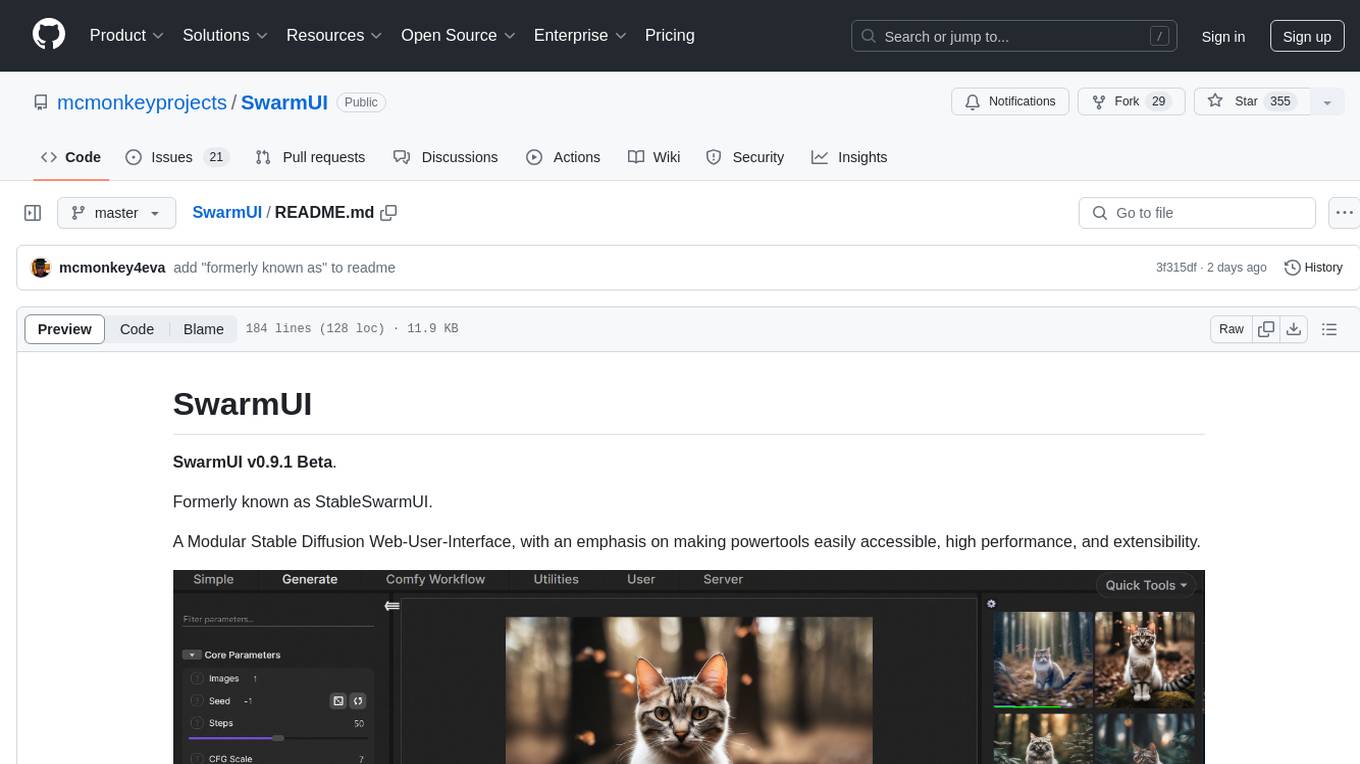
SwarmUI
SwarmUI is a modular stable diffusion web-user-interface designed to make powertools easily accessible, high performance, and extensible. It is in Beta status, offering a primary Generate tab for beginners and a Comfy Workflow tab for advanced users. The tool aims to become a full-featured one-stop-shop for all things Stable Diffusion, with plans for better mobile browser support, detailed 'Current Model' display, dynamic tab shifting, LLM-assisted prompting, and convenient direct distribution as an Electron app.

llm-code-interpreter
The 'llm-code-interpreter' repository is a deprecated plugin that provides a code interpreter on steroids for ChatGPT by E2B. It gives ChatGPT access to a sandboxed cloud environment with capabilities like running any code, accessing Linux OS, installing programs, using filesystem, running processes, and accessing the internet. The plugin exposes commands to run shell commands, read files, and write files, enabling various possibilities such as running different languages, installing programs, starting servers, deploying websites, and more. It is powered by the E2B API and is designed for agents to freely experiment within a sandboxed environment.
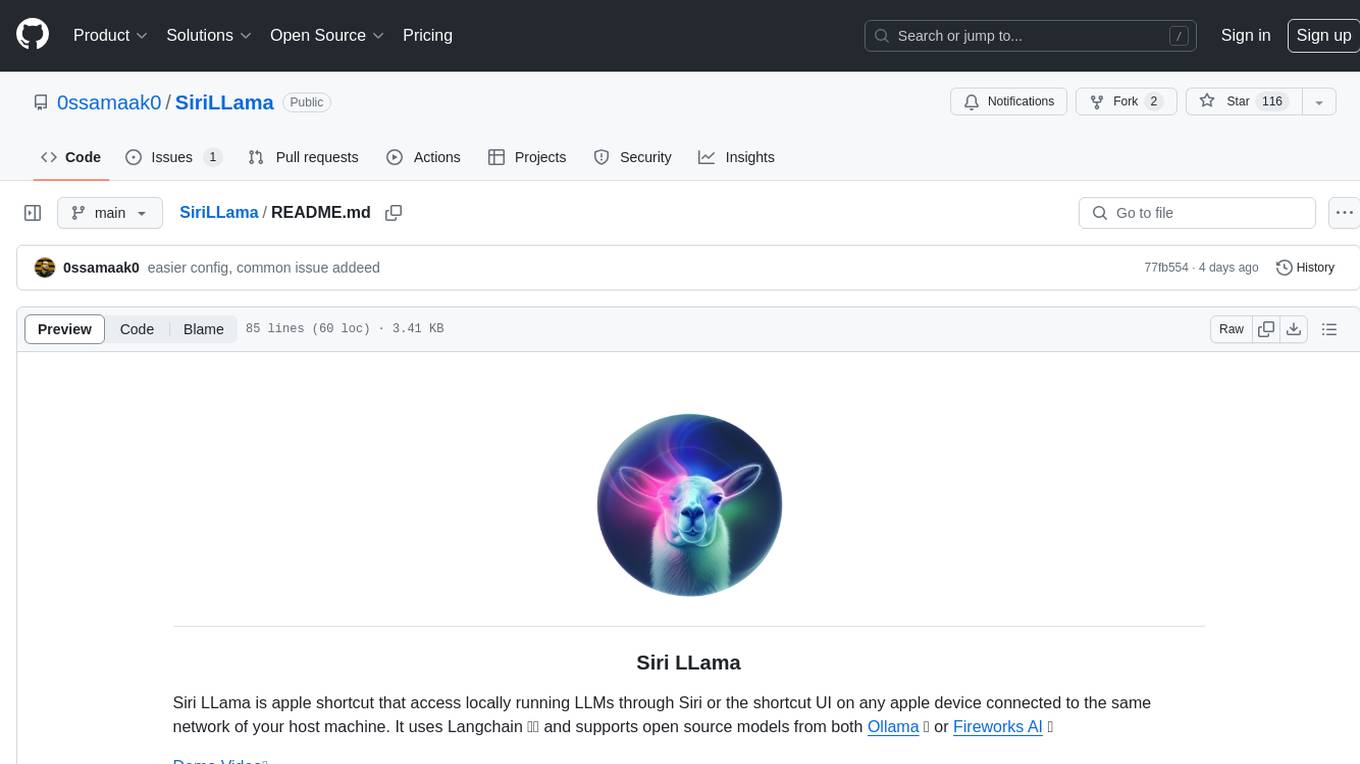
SiriLLama
Siri LLama is an Apple shortcut that allows users to access locally running LLMs through Siri or the shortcut UI on any Apple device connected to the same network as the host machine. It utilizes Langchain and supports open source models from Ollama or Fireworks AI. Users can easily set up and configure the tool to interact with various language models for chat and multimodal tasks. The tool provides a convenient way to leverage the power of language models through Siri or the shortcut interface, enhancing user experience and productivity.
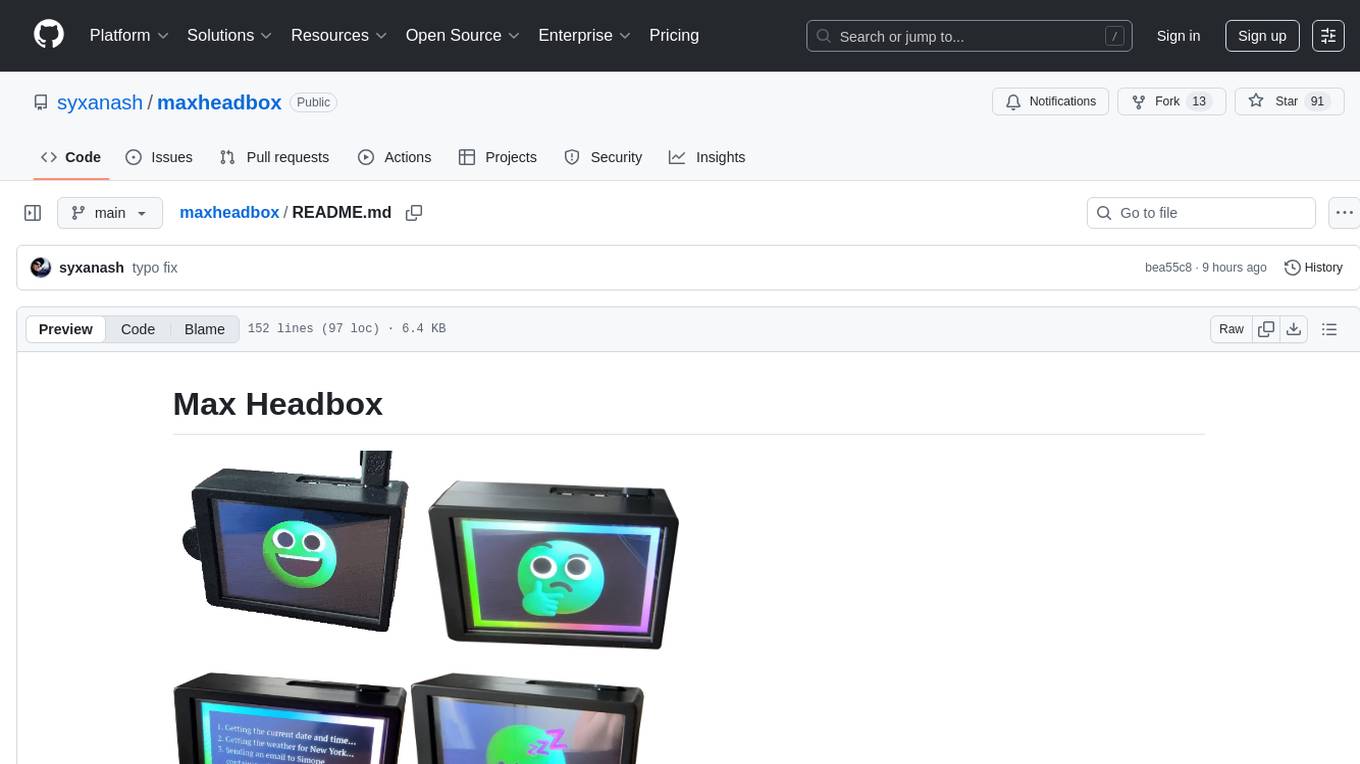
maxheadbox
Max Headbox is an open-source voice-activated LLM Agent designed to run on a Raspberry Pi. It can be configured to execute a variety of tools and perform actions. The project requires specific hardware and software setups, and provides detailed instructions for installation, configuration, and usage. Users can create custom tools by making JavaScript modules and backend API handlers. The project acknowledges the use of various open-source projects and resources in its development.
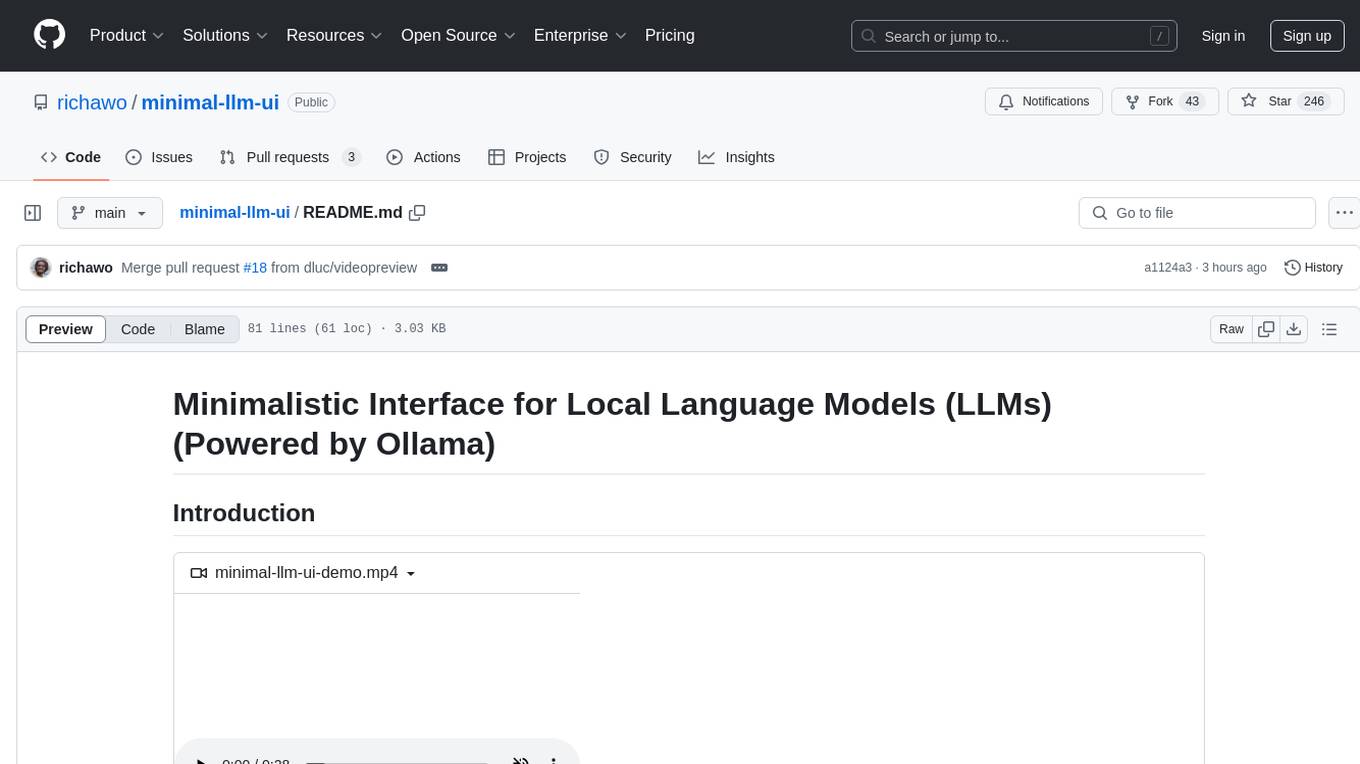
minimal-llm-ui
This minimalistic UI serves as a simple interface for Ollama models, enabling real-time interaction with Local Language Models (LLMs). Users can chat with models, switch between different LLMs, save conversations, and create parameter-driven prompt templates. The tool is built using React, Next.js, and Tailwind CSS, with seamless integration with LangchainJs and Ollama for efficient model switching and context storage.

raggenie
RAGGENIE is a low-code RAG builder tool designed to simplify the creation of conversational AI applications. It offers out-of-the-box plugins for connecting to various data sources and building conversational AI on top of them, including integration with pre-built agents for actions. The tool is open-source under the MIT license, with a current focus on making it easy to build RAG applications and future plans for maintenance, monitoring, and transitioning applications from pilots to production.
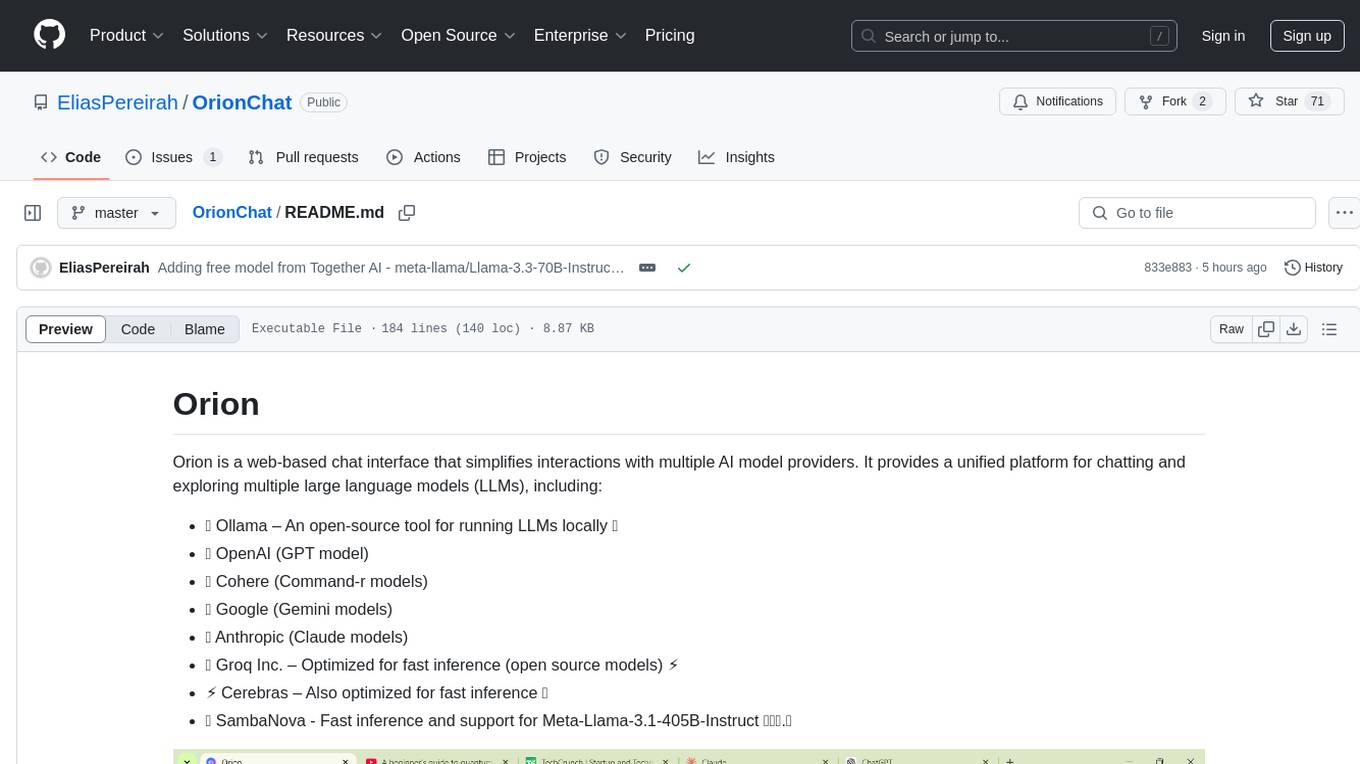
OrionChat
Orion is a web-based chat interface that simplifies interactions with multiple AI model providers. It provides a unified platform for chatting and exploring various large language models (LLMs) such as Ollama, OpenAI (GPT model), Cohere (Command-r models), Google (Gemini models), Anthropic (Claude models), Groq Inc., Cerebras, and SambaNova. Users can easily navigate and assess different AI models through an intuitive, user-friendly interface. Orion offers features like browser-based access, code execution with Google Gemini, text-to-speech (TTS), speech-to-text (STT), seamless integration with multiple AI models, customizable system prompts, language translation tasks, document uploads for analysis, and more. API keys are stored locally, and requests are sent directly to official providers' APIs without external proxies.
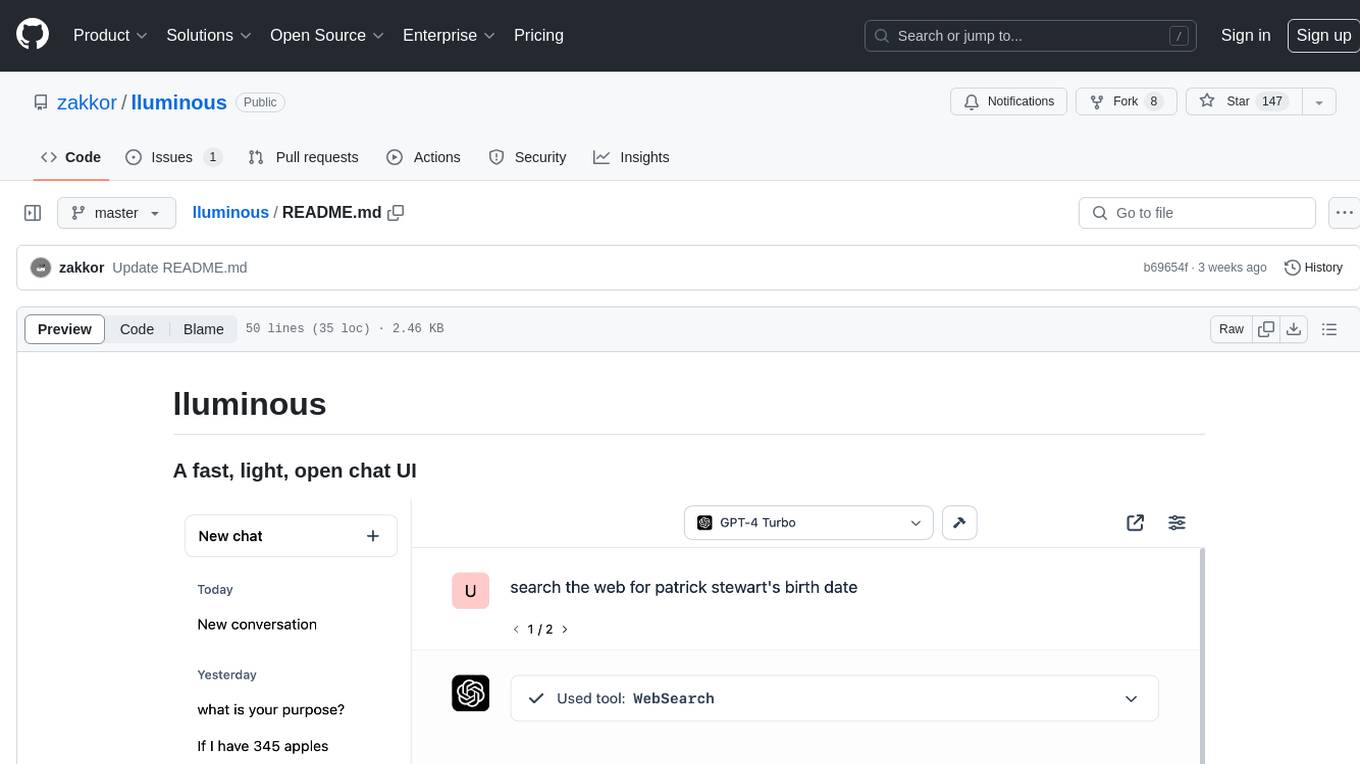
lluminous
lluminous is a fast and light open chat UI that supports multiple providers such as OpenAI, Anthropic, and Groq models. Users can easily plug in their API keys locally to access various models for tasks like multimodal input, image generation, multi-shot prompting, pre-filled responses, and more. The tool ensures privacy by storing all conversation history and keys locally on the user's device. Coming soon features include memory tool, file ingestion/embedding, embeddings-based web search, and prompt templates.

serverless-chat-langchainjs
This sample shows how to build a serverless chat experience with Retrieval-Augmented Generation using LangChain.js and Azure. The application is hosted on Azure Static Web Apps and Azure Functions, with Azure Cosmos DB for MongoDB vCore as the vector database. You can use it as a starting point for building more complex AI applications.
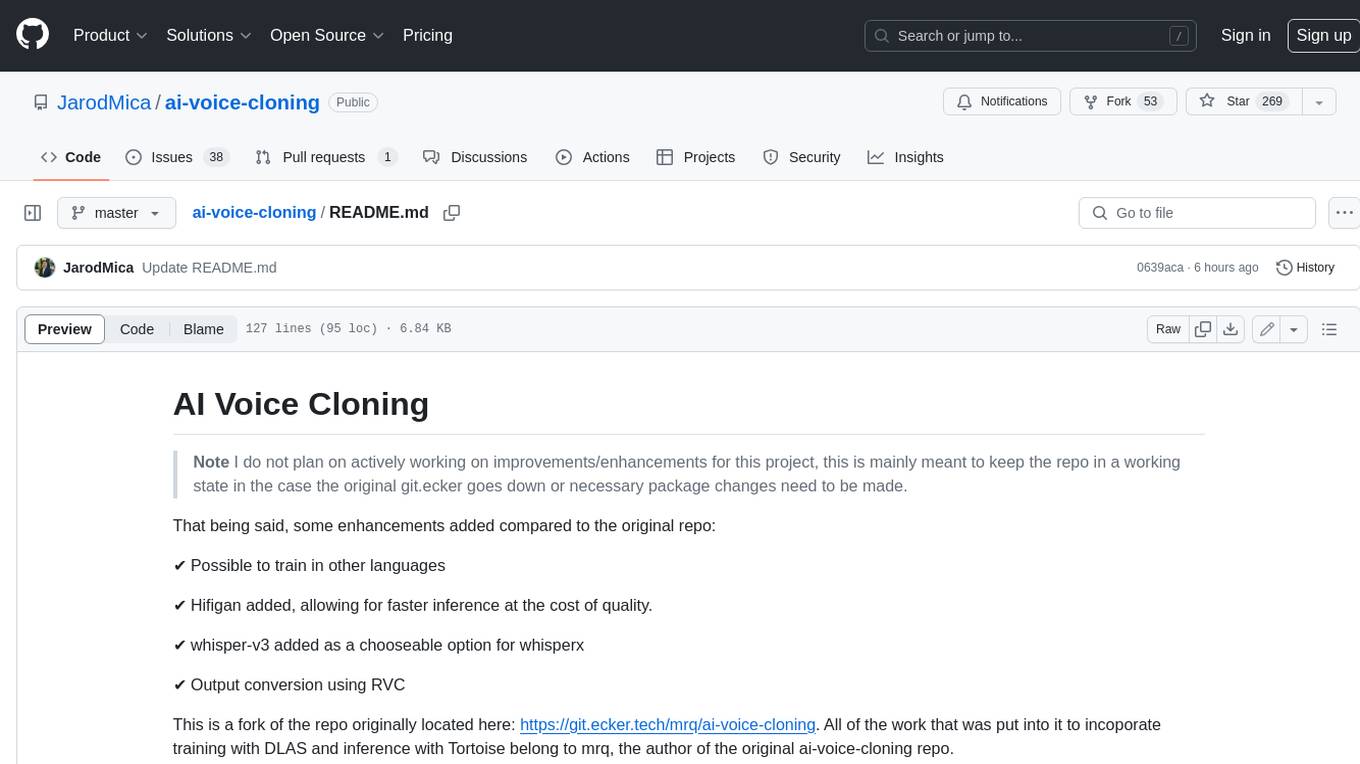
ai-voice-cloning
This repository provides a tool for AI voice cloning, allowing users to generate synthetic speech that closely resembles a target speaker's voice. The tool is designed to be user-friendly and accessible, with a graphical user interface that guides users through the process of training a voice model and generating synthetic speech. The tool also includes a variety of features that allow users to customize the generated speech, such as the pitch, volume, and speaking rate. Overall, this tool is a valuable resource for anyone interested in creating realistic and engaging synthetic speech.
For similar tasks

discord-ai-bot
Discord AI Bot is a chatbot tool designed to interact with Ollama and AUTOMATIC1111 Stable Diffusion on Discord. The bot allows users to set up and configure a Discord bot to communicate with the mentioned AI models. Users can follow step-by-step instructions to install Node.js, Ollama, and the required dependencies, create a Discord bot, and interact with the bot by mentioning it in messages. Additionally, the tool provides set-up instructions for Docker users to easily deploy the bot using Docker containers. Overall, Discord AI Bot simplifies the process of integrating AI chatbots into Discord servers for interactive communication.
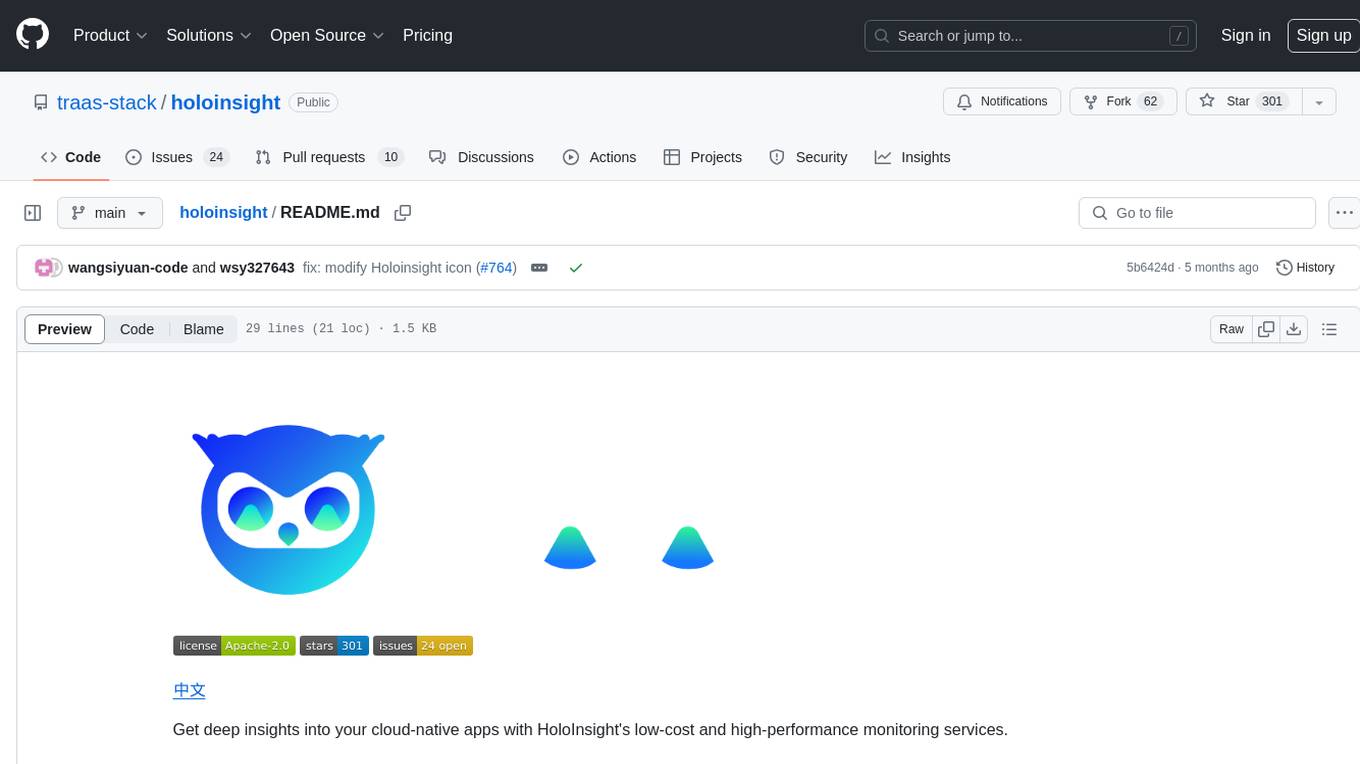
holoinsight
HoloInsight is a cloud-native observability platform that provides low-cost and high-performance monitoring services for cloud-native applications. It offers deep insights through real-time log analysis and AI integration. The platform is designed to help users gain a comprehensive understanding of their applications' performance and behavior in the cloud environment. HoloInsight is easy to deploy using Docker and Kubernetes, making it a versatile tool for monitoring and optimizing cloud-native applications. With a focus on scalability and efficiency, HoloInsight is suitable for organizations looking to enhance their observability and monitoring capabilities in the cloud.
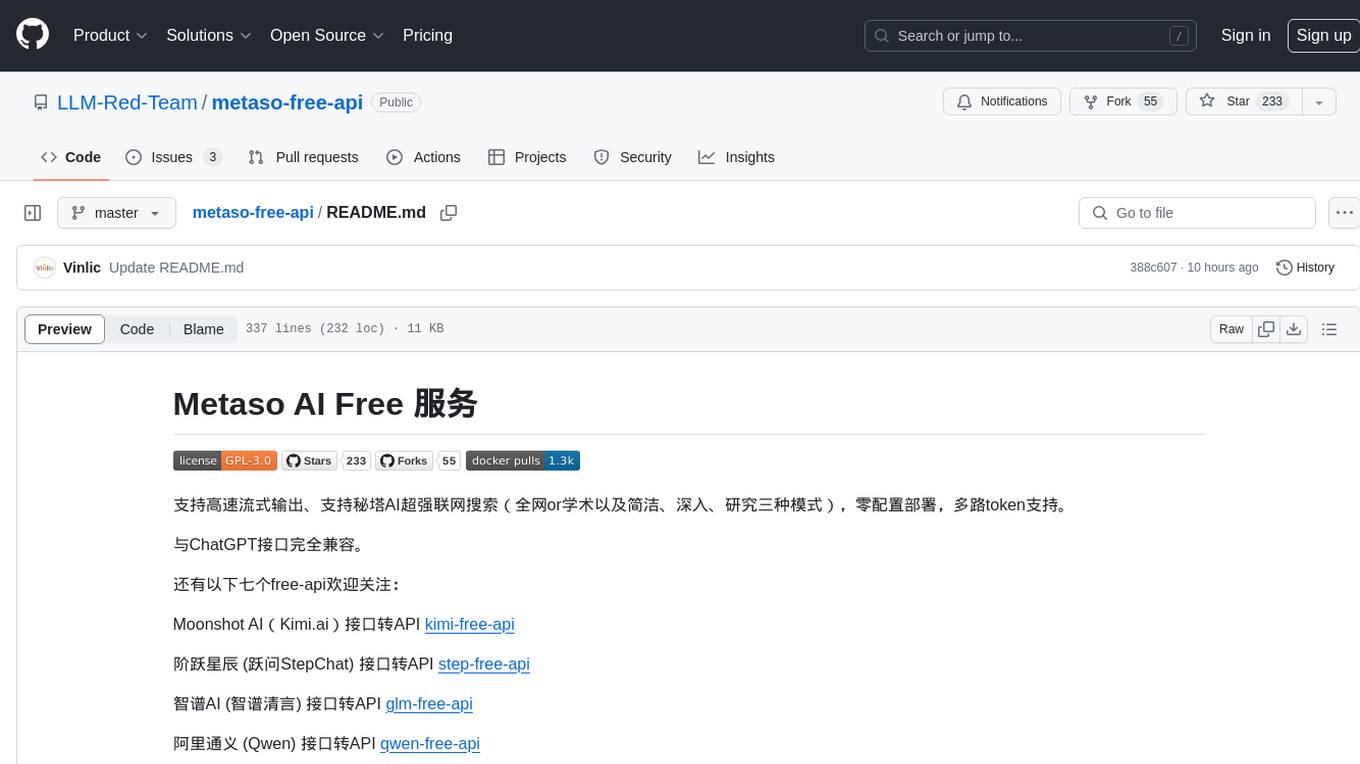
metaso-free-api
Metaso AI Free service supports high-speed streaming output, secret tower AI super network search (full network or academic as well as concise, in-depth, research three modes), zero-configuration deployment, multi-token support. Fully compatible with ChatGPT interface. It also has seven other free APIs available for use. The tool provides various deployment options such as Docker, Docker-compose, Render, Vercel, and native deployment. Users can access the tool for chat completions and token live checks. Note: Reverse API is unstable, it is recommended to use the official Metaso AI website to avoid the risk of banning. This project is for research and learning purposes only, not for commercial use.
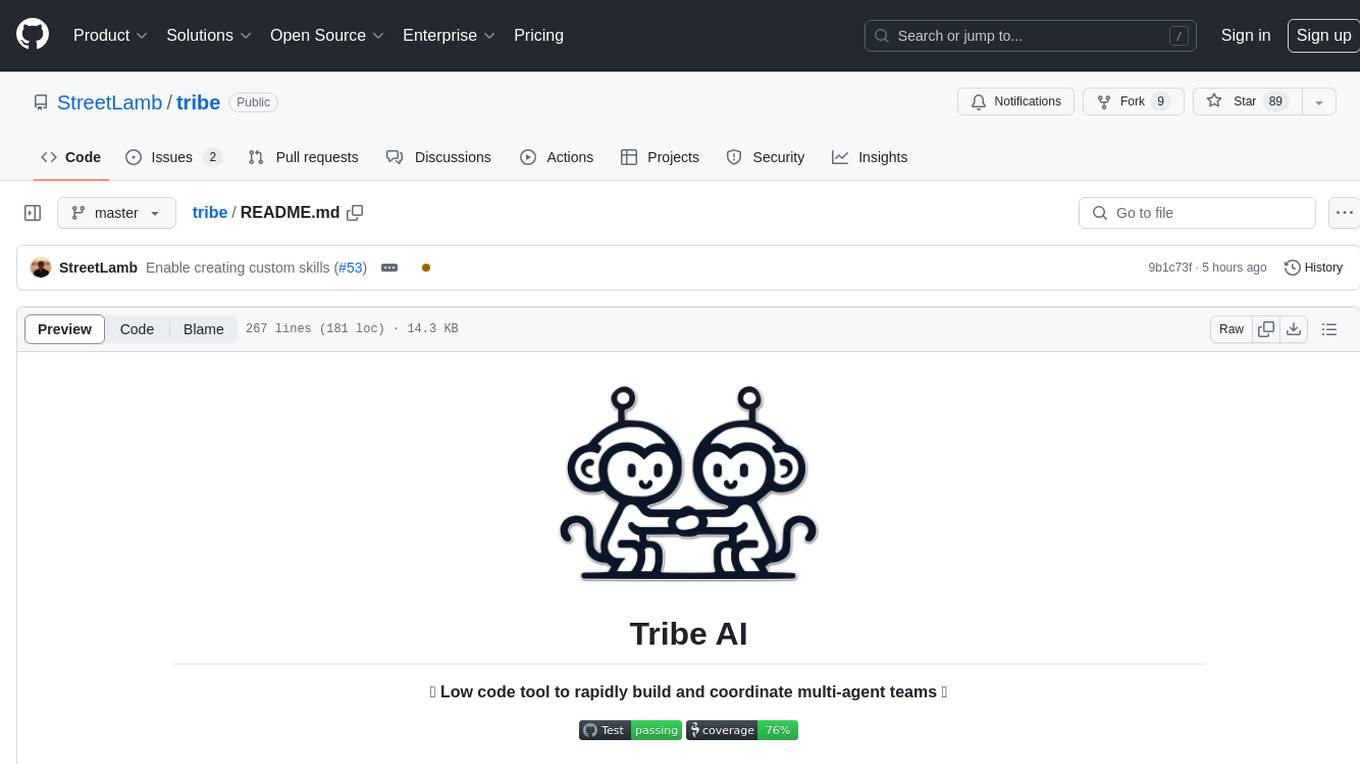
tribe
Tribe AI is a low code tool designed to rapidly build and coordinate multi-agent teams. It leverages the langgraph framework to customize and coordinate teams of agents, allowing tasks to be split among agents with different strengths for faster and better problem-solving. The tool supports persistent conversations, observability, tool calling, human-in-the-loop functionality, easy deployment with Docker, and multi-tenancy for managing multiple users and teams.
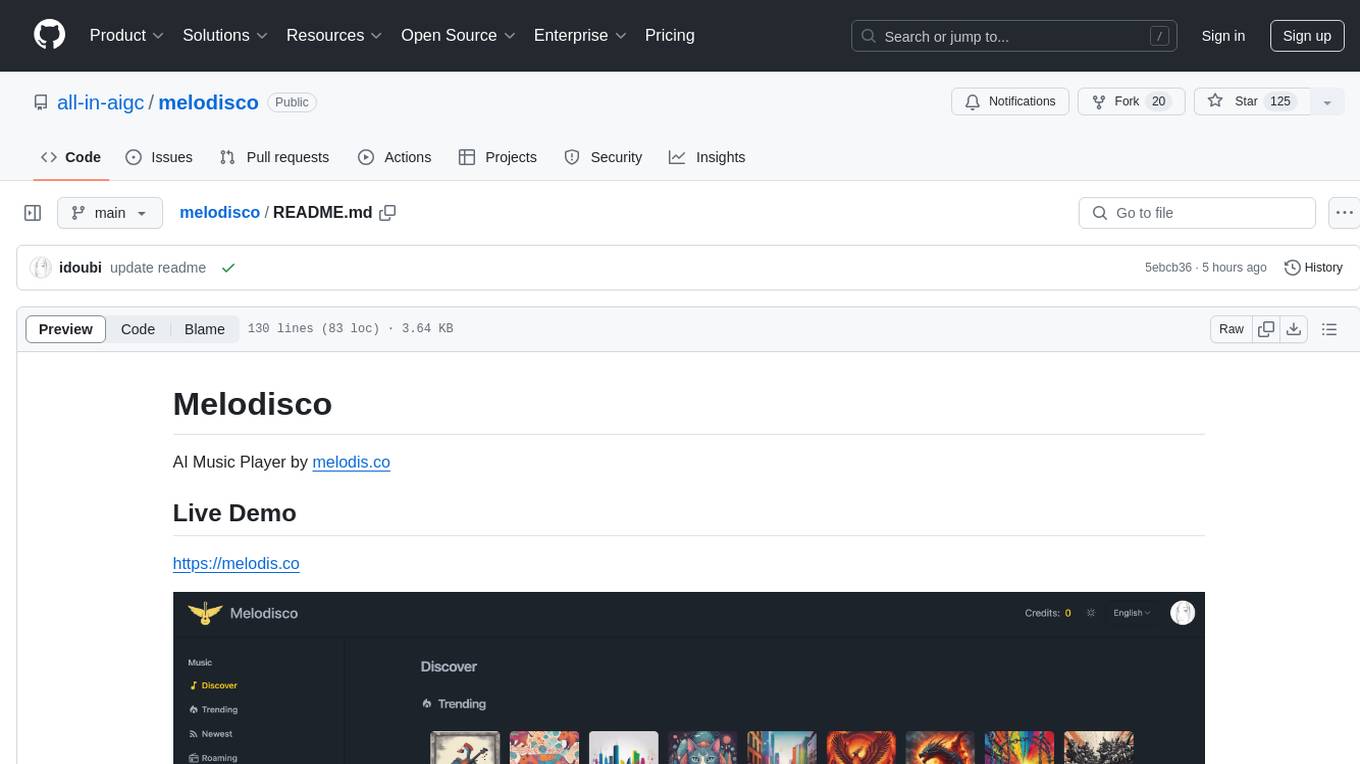
melodisco
Melodisco is an AI music player that allows users to listen to music and manage playlists. It provides a user-friendly interface for music playback and organization. Users can deploy Melodisco with Vercel or Docker for easy setup. Local development instructions are provided for setting up the project environment. The project credits various tools and libraries used in its development, such as Next.js, Tailwind CSS, and Stripe. Melodisco is a versatile tool for music enthusiasts looking for an AI-powered music player with features like authentication, payment integration, and multi-language support.
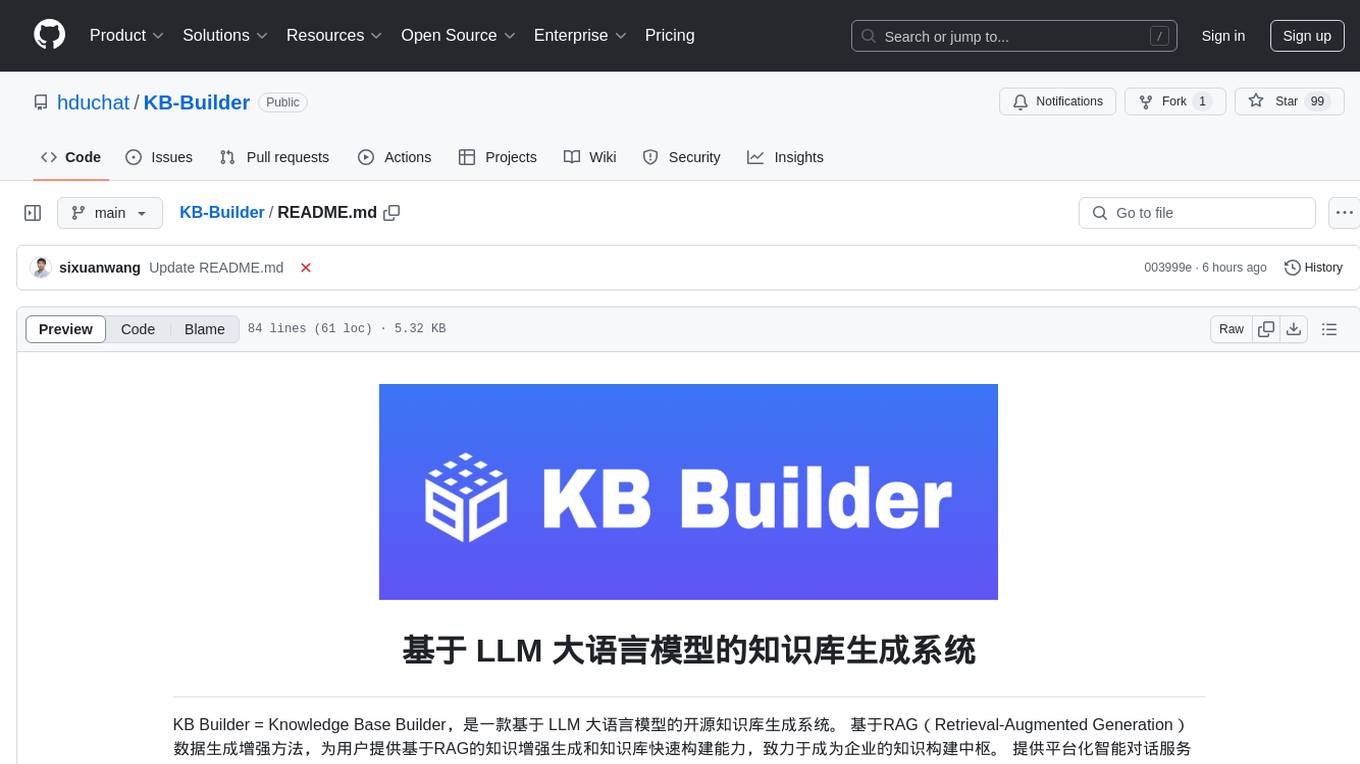
KB-Builder
KB Builder is an open-source knowledge base generation system based on the LLM large language model. It utilizes the RAG (Retrieval-Augmented Generation) data generation enhancement method to provide users with the ability to enhance knowledge generation and quickly build knowledge bases based on RAG. It aims to be the central hub for knowledge construction in enterprises, offering platform-based intelligent dialogue services and document knowledge base management functionality. Users can upload docx, pdf, txt, and md format documents and generate high-quality knowledge base question-answer pairs by invoking large models through the 'Parse Document' feature.
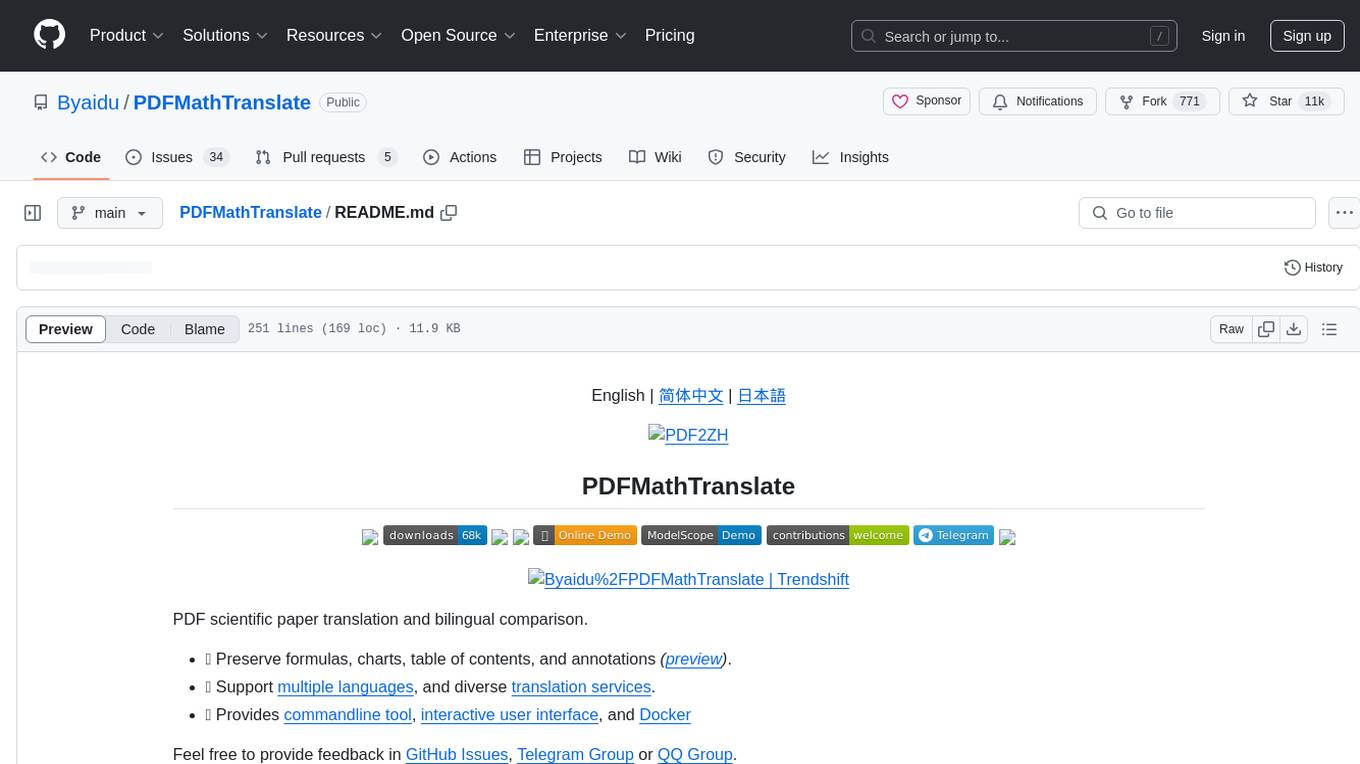
PDFMathTranslate
PDFMathTranslate is a tool designed for translating scientific papers and conducting bilingual comparisons. It preserves formulas, charts, table of contents, and annotations. The tool supports multiple languages and diverse translation services. It provides a command-line tool, interactive user interface, and Docker deployment. Users can try the application through online demos. The tool offers various installation methods including command-line, portable, graphic user interface, and Docker. Advanced options allow users to customize translation settings. Additionally, the tool supports secondary development through APIs for Python and HTTP. Future plans include parsing layout with DocLayNet based models, fixing page rotation and format issues, supporting non-PDF/A files, and integrating plugins for Zotero and Obsidian.
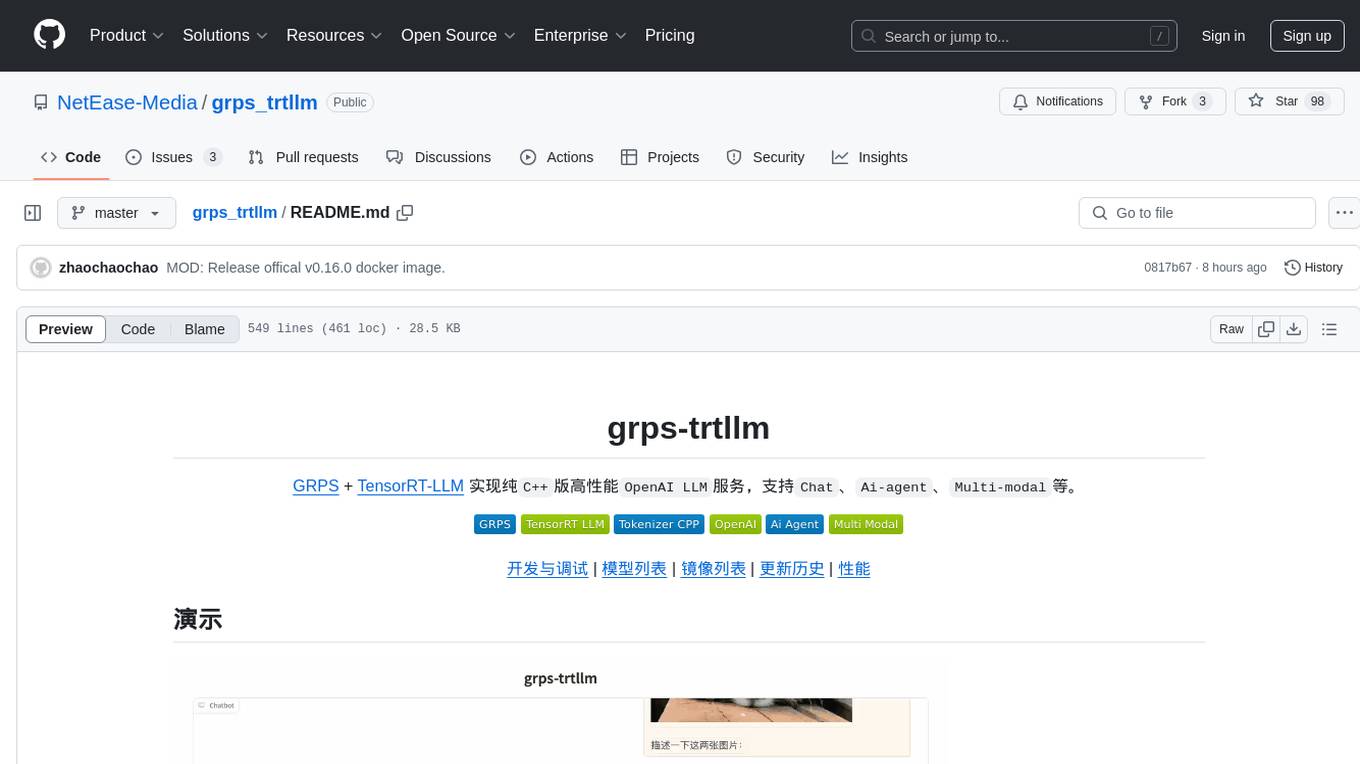
grps_trtllm
The grps-trtllm repository is a C++ implementation of a high-performance OpenAI LLM service, combining GRPS and TensorRT-LLM. It supports functionalities like Chat, Ai-agent, and Multi-modal. The repository offers advantages over triton-trtllm, including a complete LLM service implemented in pure C++, integrated tokenizer supporting huggingface and sentencepiece, custom HTTP functionality for OpenAI interface, support for different LLM prompt styles and result parsing styles, integration with tensorrt backend and opencv library for multi-modal LLM, and stable performance improvement compared to triton-trtllm.
For similar jobs

sweep
Sweep is an AI junior developer that turns bugs and feature requests into code changes. It automatically handles developer experience improvements like adding type hints and improving test coverage.

teams-ai
The Teams AI Library is a software development kit (SDK) that helps developers create bots that can interact with Teams and Microsoft 365 applications. It is built on top of the Bot Framework SDK and simplifies the process of developing bots that interact with Teams' artificial intelligence capabilities. The SDK is available for JavaScript/TypeScript, .NET, and Python.

ai-guide
This guide is dedicated to Large Language Models (LLMs) that you can run on your home computer. It assumes your PC is a lower-end, non-gaming setup.

classifai
Supercharge WordPress Content Workflows and Engagement with Artificial Intelligence. Tap into leading cloud-based services like OpenAI, Microsoft Azure AI, Google Gemini and IBM Watson to augment your WordPress-powered websites. Publish content faster while improving SEO performance and increasing audience engagement. ClassifAI integrates Artificial Intelligence and Machine Learning technologies to lighten your workload and eliminate tedious tasks, giving you more time to create original content that matters.

chatbot-ui
Chatbot UI is an open-source AI chat app that allows users to create and deploy their own AI chatbots. It is easy to use and can be customized to fit any need. Chatbot UI is perfect for businesses, developers, and anyone who wants to create a chatbot.

BricksLLM
BricksLLM is a cloud native AI gateway written in Go. Currently, it provides native support for OpenAI, Anthropic, Azure OpenAI and vLLM. BricksLLM aims to provide enterprise level infrastructure that can power any LLM production use cases. Here are some use cases for BricksLLM: * Set LLM usage limits for users on different pricing tiers * Track LLM usage on a per user and per organization basis * Block or redact requests containing PIIs * Improve LLM reliability with failovers, retries and caching * Distribute API keys with rate limits and cost limits for internal development/production use cases * Distribute API keys with rate limits and cost limits for students

uAgents
uAgents is a Python library developed by Fetch.ai that allows for the creation of autonomous AI agents. These agents can perform various tasks on a schedule or take action on various events. uAgents are easy to create and manage, and they are connected to a fast-growing network of other uAgents. They are also secure, with cryptographically secured messages and wallets.

griptape
Griptape is a modular Python framework for building AI-powered applications that securely connect to your enterprise data and APIs. It offers developers the ability to maintain control and flexibility at every step. Griptape's core components include Structures (Agents, Pipelines, and Workflows), Tasks, Tools, Memory (Conversation Memory, Task Memory, and Meta Memory), Drivers (Prompt and Embedding Drivers, Vector Store Drivers, Image Generation Drivers, Image Query Drivers, SQL Drivers, Web Scraper Drivers, and Conversation Memory Drivers), Engines (Query Engines, Extraction Engines, Summary Engines, Image Generation Engines, and Image Query Engines), and additional components (Rulesets, Loaders, Artifacts, Chunkers, and Tokenizers). Griptape enables developers to create AI-powered applications with ease and efficiency.

